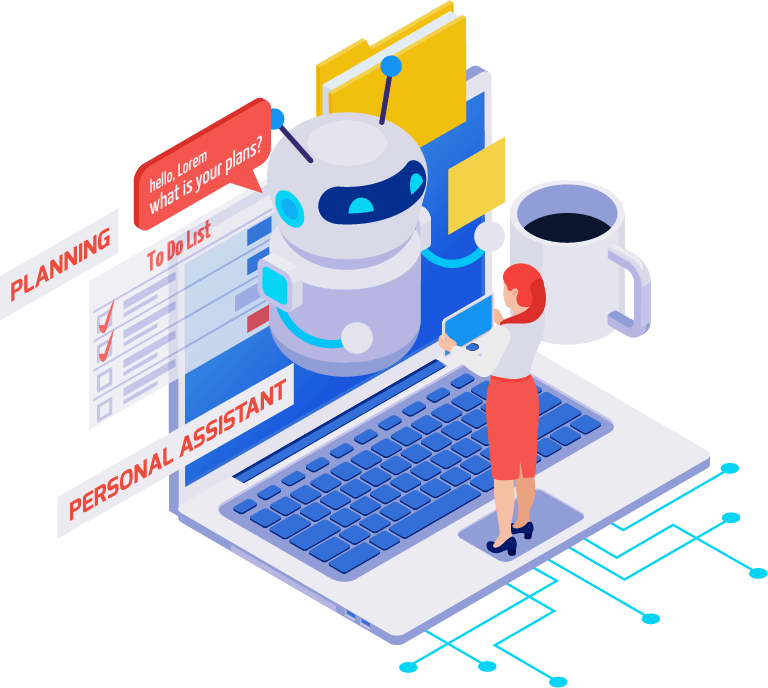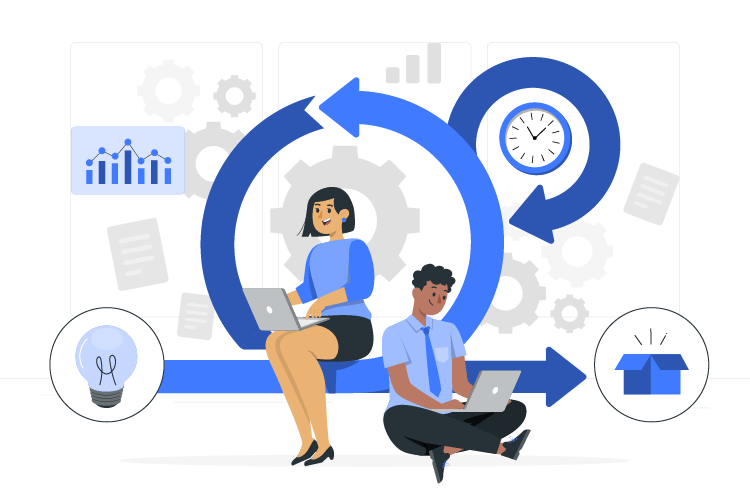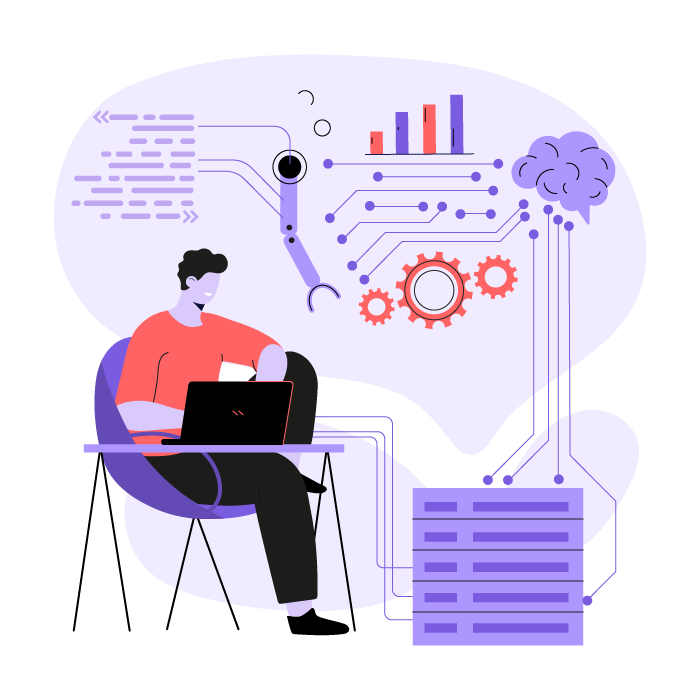In the dawn of the digital age, Artificial Intelligence (AI) has ceaselessly imprinted its mark on numerous facets of life, with modern business being no exception.
Historical Perspective of AI in Business
Tracing back to its roots, the journey of AI in the corporate realm has been a tale of steady progression and unforeseen leaps. The inception of AI can be traced back to the 1950s when it was merely a speculative concept. However, the commitment to research and continuous advancement in technology allowed AI to evolve from a distant possibility to a concrete reality.

-
Evolution of AI in Business
What began as a fascination in the 1950s has now metamorphosed into a crucial element of business strategies. Initially, AI was largely theoretical, mainly confined to research labs and academic circles. Over the decades, improvements in computational power and the advent of the internet and data technology have ushered AI into practical use.
In the 1990s and early 2000s, businesses began to adopt AI in rudimentary forms. Simple AI applications, like Microsoft’s Clippy and early voice recognition software, began to appear. While these applications were limited, they represented the first steps of AI integration into businesses.

Fast forward to the present day, and AI has rapidly shifted from being a luxury to a necessity. It has become an integral part of how businesses adapt to dynamic market trends, enhance productivity, and drive efficiency. Today, AI is used in numerous applications, from recommendation systems in e-commerce to predictive maintenance in manufacturing.
-
Milestones in AI Application
The story of AI in business is punctuated by a number of significant milestones that demonstrated its potential. In the 1990s, IBM’s Deep Blue, a chess-playing computer, defeated the reigning world champion, marking a significant triumph for AI. This achievement underscored the potential of AI to process information and make decisions in ways that could rival human intelligence.

Another major milestone came in 2011 when IBM’s Watson won a game of Jeopardy against two of the show’s top champions. Watson’s ability to understand natural language and respond to complex questions opened up new possibilities for AI in various business applications.
From the introduction of simple chatbots to complex AI-driven decision-making systems, AI has gradually cemented its place in the corporate world. These milestones represent just a glimpse of what AI has achieved and hint at the transformative potential it holds for the future of business.
Understanding AI and Its Components
To grasp the true impact of AI on business, it’s crucial to first understand what AI is and the components that drive its functionalities. The idea of AI can often be mystified by its association with advanced and complex technology. However, in its simplest form, AI refers to the simulation of human intelligence processes by machines, particularly computer systems.

-
Defining AI
AI, in the simplest terms, refers to machines programmed to mimic human intelligence. But it’s much more than just copying human actions. It involves learning from experience, understanding complex content, extracting meaningful insights, recognizing patterns, and making informed decisions.
The objective of AI is not just to increase speed and efficiency, but also to take over tasks that would require human intelligence. In the context of business, this could range from recognizing customer purchase patterns and predicting future trends to making strategic business decisions based on vast amounts of data.
-
Key Components of AI
AI is a broad field with several interrelated components. The foundational pillars of AI that contribute to its revolutionary impact are Machine Learning, Deep Learning, Natural Language Processing, and Robotics.
- Machine Learning: Machine Learning (ML) is a core part of AI. It’s a technology where algorithms learn from data, allowing AI systems to make decisions, predictions, or recommendations without being explicitly programmed to do so. ML helps AI systems improve over time as they are exposed to more data.
- Deep Learning: A subset of ML, Deep Learning mimics the neural networks of the human brain to process vast amounts of information. It’s responsible for breakthroughs in complex areas like image and speech recognition. In business, Deep Learning can be used for image-based product recommendations, voice assistants, and much more.
- Natural Language Processing (NLP): NLP is the branch of AI that focuses on the interaction between computers and humans through natural language. The ultimate goal of NLP is to read, decipher, understand, and make sense of human language in a valuable way. In business, NLP is primarily used for chatbots and voice assistants.
- Robotics: Robotics is the field of AI that involves the creation of machines to replicate human actions. In business, robots can perform repetitive tasks more efficiently than human workers, and they are often used in production lines, warehousing, and even in customer service roles.

Understanding these components can provide valuable insight into the capabilities of AI, enabling businesses to harness its power more effectively.
Current Applications of AI in Business
AI is no longer a futuristic idea, but a reality that is changing the way businesses operate in the present day. Its applications span across industries and functions, pushing the boundaries of what’s achievable through technology and providing businesses with unprecedented opportunities for growth and innovation.
-
Improving Customer Service
One of the most noticeable applications of AI in modern business is its role in enhancing customer service. In an era where customer expectations are constantly rising. AI has become a powerful tool for businesses to improve customer interactions, increase responsiveness, and provide personalized experiences.

AI-powered chatbots and virtual assistants are becoming increasingly common. They can provide 24/7 support, answering frequently asked questions, assisting in booking or purchasing processes, and even providing personalized product recommendations based on customer behavior and preferences.
Furthermore, AI-driven analytics can be used to predict customer behavior and preferences, enabling businesses to proactively address customer needs and deliver highly targeted marketing campaigns. Such personalized experiences not only improve customer satisfaction but also drive customer loyalty and brand affinity.
-
Streamlining Operations
AI is also playing a vital role in streamlining operations and enhancing efficiency across various industries. By automating repetitive tasks, AI frees up employees to focus on higher-value and strategic activities, thus improving productivity.

In manufacturing, AI can power predictive maintenance, where AI algorithms predict when a machine is likely to fail or require service, thereby preventing unexpected downtime and reducing maintenance costs.
In supply chain management, AI is used for demand forecasting, determining the optimal delivery routes, automating inventory management, and improving supplier selection processes. Such optimizations can lead to substantial cost savings and improve the overall efficiency of business operations.
-
Driving Innovation and New Product Development
AI’s predictive and analytical prowess is enabling businesses to innovate and create products that meet evolving consumer needs. By analyzing vast amounts of data, AI can identify emerging trends, patterns, and consumer preferences that can guide the development of new products and services.
Moreover, AI can accelerate the product development process. For instance, it can be used for rapid prototyping and virtual product trials, which not only speeds up the development process but also significantly reduces costs.
AI can also foster a culture of continuous innovation within businesses. By providing insightful and data-driven inputs, AI can empower teams to think creatively, take informed risks, and continuously improve their offerings.
In sum, the current applications of AI in business are vast and varied, ranging from customer service and operations to innovation and product development. These applications showcase the transformative potential of AI, positioning it as a pivotal tool for modern business success.

Case Studies: Successful Integration of AI in Business
Real-world case studies can best illustrate the transformative role of AI in revolutionizing business operations and strategies. Here, we will delve into two such instances that demonstrate the successful integration of AI in the business arena.
-
Case Study 1: Starbucks
A prime example of AI’s transformative impact on business can be seen in Starbucks, a world-renowned coffeehouse chain. The company has deeply integrated AI into its business operations, most notably through its customer service and personalization efforts.
Starbucks uses an AI program named “Deep Brew“ to personalize marketing messages for its customers. Deep Brew analyzes the customer’s past orders, the time of day, and even the weather to recommend products that the customer might enjoy. This high level of personalization has led to improved customer satisfaction rates and increased sales.
Moreover, Starbucks uses AI to streamline its operations. For instance, it uses predictive analytics to determine the optimal quantity of food items for each location, reducing waste and optimizing sales.
-
Case Study 2: Amazon
Another compelling illustration of AI’s role in modern business is the success story of Amazon, the global e-commerce giant. Amazon has been a pioneer in integrating AI into its business operations, specifically in logistics and customer service.
Amazon’s supply chain is powered by AI and machine learning algorithms, which help forecast demand, optimize delivery routes, and manage inventory. The company’s use of AI extends to its fulfillment centers, where robots assist in retrieving items, thereby reducing the time taken to fulfill an order and enhancing productivity.
In terms of customer service, Amazon’s AI-powered voice assistant, Alexa, plays a crucial role. Alexa not only helps users with shopping but also answers queries, controls smart home devices, and even recommends products based on past purchases. Making shopping a seamless experience for customers.
These case studies underscore how AI can drive operational efficiency, improve customer service, and ultimately contribute to business success. They serve as inspirations for other businesses to leverage AI, offering a glimpse into the significant benefits that AI adoption can bring.
Future Prospects: AI and the Business of Tomorrow
While AI’s current applications in business are impressive, the future of AI holds even more promise. As technology continues to advance, AI is poised to play an increasingly influential role in shaping the businesses of tomorrow.
-
The Future of Customer Service
AI’s role in customer service is expected to expand significantly in the future. With advances in natural language processing and understanding, AI-powered virtual assistants and chatbots will be able to handle more complex inquiries and provide even more personalized service. Moreover, as AI gets better at understanding and predicting customer behavior, businesses will be able to anticipate customer needs and preferences with greater accuracy, delivering truly personalized customer experiences.
-
Automation and Operational Efficiency
The scope of AI-driven automation will continue to increase, leading to further improvements in operational efficiency. As AI technology becomes more sophisticated, we can expect to see its application in more complex, decision-making processes, not just routine, repetitive tasks. In supply chain management, for instance, AI could be used to make strategic decisions. Like sourcing and distribution, based on a wide range of factors including market trends, geopolitical events, and environmental considerations.
-
AI-driven Innovation
AI will continue to be a key driver of innovation. With its ability to analyze vast amounts of data and identify trends and patterns, AI will become an indispensable tool for businesses looking to stay ahead of the curve. From designing new products and services to identifying new business opportunities, AI will play a critical role in shaping the strategic direction of businesses.
-
Ethical Considerations
As AI becomes more prevalent, businesses will need to pay greater attention to ethical considerations. Issues related to privacy, data security, and the fair use of AI will become increasingly important. Businesses will need to ensure that their use of AI aligns with ethical guidelines and societal expectations, and they may need to work closely with regulators to develop appropriate policies and practices.
In conclusion, the future of AI in business looks bright. While there will undoubtedly be challenges along the way, the potential benefits of AI are enormous. Businesses that are able to effectively harness the power of AI will be well-positioned to thrive in the business landscape of tomorrow.
Navigating the Future: AI and Business Convergence
As AI continues to evolve, the convergence of AI and business becomes more pronounced. This convergence is not merely about using AI as a tool, but integrating AI at the core of business strategies. To navigate this future effectively, businesses need to adopt a strategic approach towards AI adoption, focusing on skills, partnerships, and ethical considerations.
-
Investing in AI Skills
In order to leverage the full potential of AI, businesses need to invest in developing AI skills within their organizations. This involves not only training existing staff but also hiring new talent with expertise in AI. By doing so, businesses can ensure that they have the capabilities needed to develop, implement, and maintain effective AI solutions.

-
Forming AI Partnerships
As the field of AI becomes increasingly specialized, businesses may need to form partnerships with external AI service providers. These providers can bring in-depth expertise and state-of-the-art technology to the table, allowing businesses to take advantage of the latest developments in AI. Such partnerships can also help businesses accelerate their AI adoption journey and achieve better results.
-
Ensuring Ethical Use of AI
As mentioned earlier, the convergence of AI and business brings with it a host of ethical considerations. Businesses need to put in place robust policies to ensure the ethical use of AI. This includes respecting privacy, ensuring transparency, and mitigating biases in AI algorithms. By doing so, businesses can build trust with their customers and stakeholders, and ensure that their use of AI is both responsible and sustainable.
-
Preparing for an AI-driven Future
Finally, businesses need to prepare themselves for an AI-driven future. This involves being proactive about exploring new AI opportunities, adapting business models as needed, and being willing to take calculated risks. By doing so, businesses can ensure that they are ready to seize the opportunities offered by AI, and are well-prepared to navigate the challenges that lie ahead.
In conclusion, navigating the future of AI and business convergence requires a strategic and proactive approach. Businesses that can successfully integrate AI into their operations and strategies stand to gain a significant competitive edge in the business landscape of the future.
FAQ Section
Q1: How is AI improving customer service?
A1: AI is enhancing customer service through chatbots, AI-driven analytics, and personalized recommendations.
Q2: How does AI streamline operations?
A2: AI streamlines operations by automating repetitive tasks, enhancing predictive maintenance, and optimizing supply chain management.
Q3: How is AI fostering innovation in businesses?
A3: AI is fostering innovation by enabling data-driven market research, virtual product trials, and predictive analytics for new product development.
Q4: What are the key components of AI?
A4: The key components of AI include Machine Learning, Deep Learning, Natural Language Processing, and Robotics.































































Comments 2